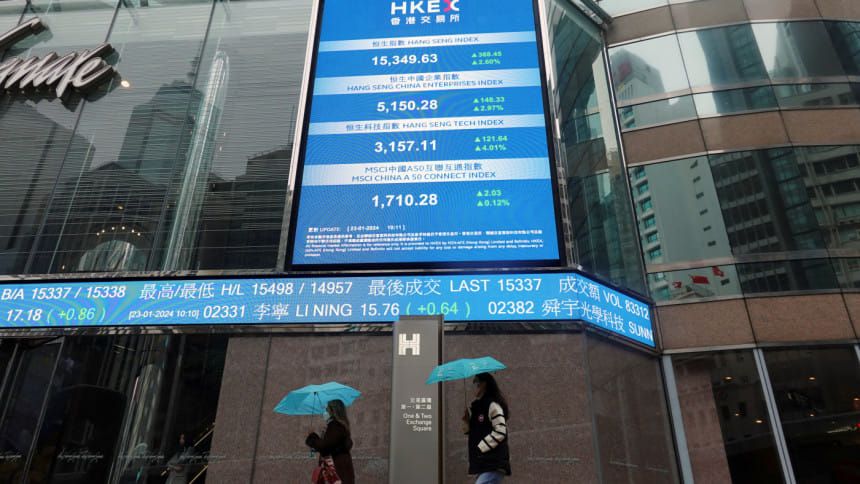Stock markets slump, oil jumps on Middle East concerns

Global markets sank and oil soared Tuesday, after Iran launched around 180 missiles at Israel, prompting fears of a region-wide conflagration after almost a year of war in Gaza.
US and European stocks turned sharply lower after the strikes, which Iran launched in response to the killings of Tehran-backed militant leaders.
Most missiles were intercepted by Israeli air defences or by air forces before they reached Israel, and the Israeli military announced after around an hour that the attack was over.
The headlines caused a sharp turnaround on global markets, with Wall Street's main indices sinking and the tech-heavy Nasdaq dropping 1.5 percent.
Gold, considered a safe haven asset, jumped around one percent to a new record high just above $2,600 an ounce because of the tensions.
Earlier, European shares opened higher after the eurozone's annual inflation rate slowed. US shares closed lower as a recent rally ran out of steam ahead of economic reports this week that should shine greater light on the direction of interest rates.
The mood also soured as US dockworkers went on strike at East and Gulf coast ports, which could cost the world's largest economy billions of dollars a day and stoke inflation.
"Participants cast a wary eye toward escalating Middle East tensions and a US port strike while awaiting the first batch of this week's pivotal US jobs and manufacturing data," said Joe Mazzola, a strategist at Charles Schwab.
Official data showed that eurozone inflation fell below the European Central Bank's two-percent target in September for the first time since 2021.
The fall "opens room for the ECB to cut rates again on October 17," said GianLuigi Mandruzzato, an economist at EFG Asset Management.
Paris lagged behind other European bourses as new Prime Minister Michel Barnier presented the policies of his fragile minority government to parliament, including spending cuts and higher taxes for companies.
Barnier said it would take two years longer than previously planned for France to reduce its deficit to the European Union limit of three percent of national output as the country faces a massive debt pile.
London was the only major market to break the trend, rising on the back of energy companies.
There are several US economic reports expected this week. By far the most important for the markets is Friday's monthly jobs report.
In Asia, Hong Kong and mainland Chinese bourses closed for a holiday after thundering higher over the past week on China's new economic stimulus.
Tokyo closed up almost two percent, paring some of Monday's nearly five-percent drop, as the yen pulled back against the dollar, giving Japanese exporters some much-needed relief.
Data showing Japanese business confidence remained positive in the third quarter also provided support.
Oil prices initially slid on expectations of increasing supply after Libya appointed a new central bank governor Monday, a key step to resolving a dispute between the country's rival administrations and allowing oil output to resume.
Oil prices shot higher after news of Iran's operation, before pulling back slightly.

 For all latest news, follow The Daily Star's Google News channel.
For all latest news, follow The Daily Star's Google News channel. 








Comments